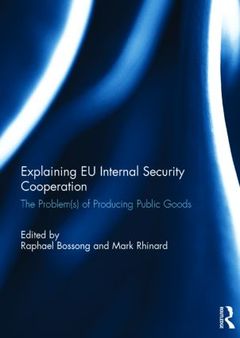Explaining EU Internal Security Cooperation The Problem(s) of Producing Public Goods
Coordonnateurs : Bossong Raphael, Rhinard Mark

Internal security is often hailed as a rapidly expanding area of European integration, with a growing number of strategies, policies and framework agreements in recent years. Yet actual cooperation, when viewed closely, proceeds at a halting pace ? raising questions as to why cooperation appears so problematic. This book presents a novel, theoretically-informed way to understand internal security cooperation in Europe. The approach treats internal security as a "public good" requiring collective action amongst sovereign governments. All governments must contribute to the production of a public good; once produced, the public good benefits all governments. Fundamental obstacles to producing a public good thus arise, and can help explain the underlying difficulties facing European cooperation on internal security matters. The chapters in this book apply a public goods approach to different internal security issues, ranging from terrorism to border management, and from environmental security to natural disasters. Each study demonstrates how the various goals of internal security cooperation resemble different forms of public goods ? and thus present different kinds of obstacles to effective cooperation. This book fills a theoretical gap in the literature on European internal security cooperation with a proven approach increasingly used in other scholarly fields.
This book was published as a special issue of European Security.
1. European internal security as a public good 2. Understanding European asylum cooperation under the Schengen/Dublin system: a public goods framework 3. Public good theory and the ‘added value’ of the EU’s anti-terrorism policy 4. Evolving patterns of internal security cooperation: lessons from the Schengen and Prüm laboratories 5. EU police and judicial cooperation before the Treaty of Lisbon: strengthening of the weakest link? 6. Green consumer markets in the fight against climate change 7. Explaining civil protection cooperation in the EU: the contribution of public goods theory
Date de parution : 07-2014
17.4x24.6 cm
Thème d’Explaining EU Internal Security Cooperation :
Mots-clés :
Public Goods Theory; EU Internal Security Cooperation; EU Internal Security; Civil Protection Cooperation; Internal Security Cooperation; Public Goods Approach; European Union security; EU Member State; Internal security; European Arrest Warrant; Justice and Home Affairs; Dublin System; Public goods; EU’s Fight; Collective action; Judicial Cooperation; Raphael Bossong; Transboundary Crime; Eiko Thielemann; EU Treaty Framework; Carolyn Armstrong; Green Energy; Helmut P; Gaisbauer; Partial Rivalry; James Sperling; Automatic DNA; Elke Krahmann; Proactive Counterterrorism; Simon Hollis; Military Expenditure; Arjen Boin; Anti-terrorism Cooperation; Schengen Regime; UK Government Initiative; Tampere Milestones; Fighting Climate Change; EU JHA; Carbon Offsetting



